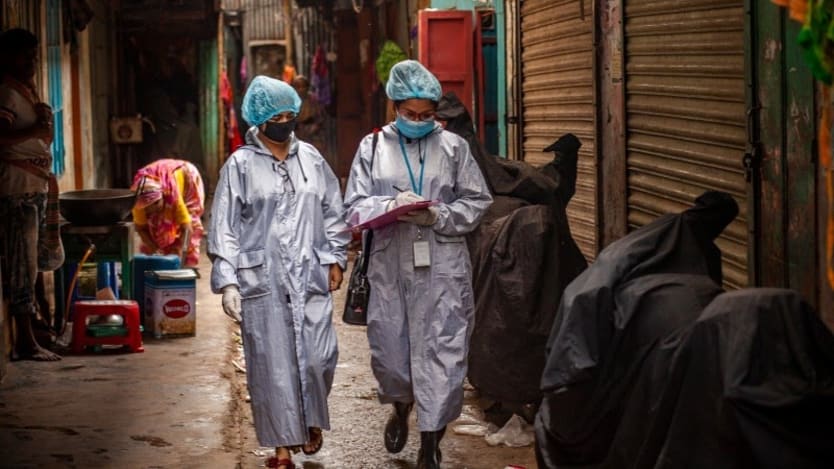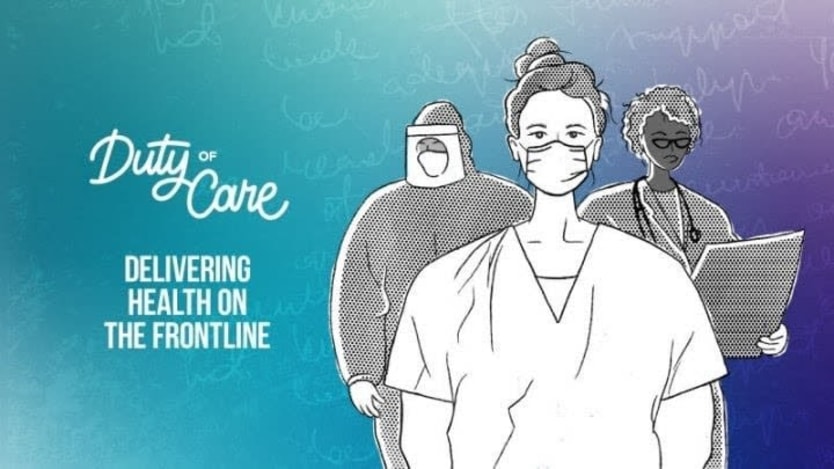
BARCELONA — The forecasted shortage of 18 million health workers by 2030 and the drive for universal health coverage have brought concerns over workforce motivation and performance to the forefront. And now, the COVID-19 pandemic has put additional demands and risks on frontline personnel while further stretching health budgets.
Financial incentives range from salary top ups to health insurance to housing. But what are the upsides and downsides of the various incentives? And what factors should authorities, development partners, and donors take into account when designing fair and sustainable financial incentive schemes?
1. Getting paid on time, fairly
Despite COVID-19 showing how important health workers are, many still fail to be financially compensated on time and adequately. “Paying wages on time is the simplest action governments can take to maintain a level of motivation or, at least, prevent one of the commonly encountered demotivating factors,” says Senior Director of Health Workforce Development at IntraHealth International Dr. Andrew Brown.
In the absence of a minimum wage, health workers are forced to find other sources of income in or out of the health sector, Brown said. This can happen on agreed terms with governments as is the case in the Solomon Islands, where health workers are allowed to spend time in their garden to grow food. However, in most cases, it is an informal coping strategy by which health workers try to meet their basic needs.
Insufficient wages and delays in payments are widespread. “In India, timely reimbursement of community health workers is a concern; sometimes, they even need to pay supervisors a ‘fee’ to access their compensation,” said Dr. Smisha Agarwal, a researcher at the Johns Hopkins Bloomberg School of Public Health, who is now leading study on retention of community health workers, or CHWs, in Uganda, Kenya, Bangladesh, and Haiti alongside the Frontline Health project.
Duty of Care:
► As easy as pie: how telecare is helping Brazil's health care workers
► Q&A: Supporting health workers through the pandemic
► Shortage of health care workers plagues India's fight against COVID-19
“Also, you cannot show up, give a handful of money to a CHW once and expect years of support in return; we need clear expectations on both sides,” said Adam Weiss, director of The Carter Center Guinea Worm Eradication Program, drawing on two decades of experience in countries such as Chad, Mali and South Sudan.
Across Africa, nurses and physicians who are paid as little as $30 a month have recently taken the streets to protest against their working conditions, which have worsened with the COVID-19 pandemic. Sierra Leone, Zimbabwe, the Democratic Republic of the Congo, and Kenya are some of them.
“Despite collective bargaining arrangements between unions and the Kenya Ministry of Health, many of the 47 counties don’t follow through with the payment of allowances, including hazard pay, and salaries are frequently delayed for months,” said ThinkWell Country Director Anne Musuva. “Health workers are always looking for opportunities elsewhere.”
2. Cover basic needs
General practitioner Dr. Patrick Kairu has experience in the public and private sectors of his home country, Rwanda, as well as with international organizations and clinics in the United Arab Emirates. He noted that many low-resource countries are not able to pay overtime or hardship allowances, which makes health workers reluctant to serve in areas with a low doctor-to-patient ratio.
“Governments may not be able to pay much, but they should at least provide housing with running water and electricity — these utilities are expensive and sometimes hard to come by in remote areas,” Kairu said. Better living conditions are considered a financial incentive, alongside wages, insurance, transportation allowances and pensions.
“In our experience, access to housing, continual professional education and access to good schooling for children are often preferred to a wage increase, especially in the presence of a minimal living wage,” said Brown from IntraHealth, which hosts the Frontline Health Workers Coalition.
3. Provide health insurance
Unlike civil servants, community health workers rarely access pension plans and health insurance. In rural Bangladesh, CARE has teamed up with the local company Digital Healthcare Solutions to provide 300 private health care providers with free-of-charge “corona insurance" as a follow up to its Skilled Health Entrepreneur program with GSK.
“Paying wages on time is the simplest action governments can take to maintain a level of motivation.”
— Dr. Andrew Brown, senior director of health workforce development, IntraHealth InternationalThe corona insurance is also available to community members through a $1 prime that is valid for three months and renewable. Benefits range from $20 to $30 in case of disease, to $50 for hospitalization, and up to $300 for death, explained the coordinator of CARE’s Health System Strengthening Unit in Bangladesh, Dr. Ahsanul Islam.
One member of the SHE program, Marzia Begum, a widow and mother of one, says she has worked for several national development programs, but had never been insured before.
“I now feel more protected, and the money I earn promoting the insurance in the community helps support my family,” she said. This 10% commission is one of the ways private health providers like the one Begum has generate an income, besides offering a range of basic health services and products in agreement with local and national health authorities.
4. Performance-based payments
Paying for performance, also called P4P, can improve retention and quality, but implementers must be aware of its limitations. Johns Hopkins’ Agarwal sees P4P as an option for CHWs if it is on top of a base salary.
“Should health workers who are working up nine-hour days only receive pay for performance? That doesn’t seem fair,” she said. “P4P measures are also hard to keep track of in systems where data quality is often poor and the mechanisms to address accountability are fairly limited.”
P4P initiatives are mostly implemented by projects, rather than governments. According to ThinkWell Program Director Nirmala Ravishankar, the World Bank and other organizations have supported performance-based financing in many African countries to reward health facilities based on their outputs.
“But regularizing P4P beyond project cycles has been a challenge; governments don’t always have the money and they cannot start paying health workers more without having other public sectors demand raises,” Ravishankar said.
The bottom line being that, “if you are considering a financial incentive, be certain it can be maintained into the future, especially if performance systems are created during a project cycle,” agreed Brown. Managers also need to be well trained and prepared not to grant incentives if targets are not reached, he said.
6. Incentives in COVID-19 times
Health care programs must tailor incentive schemes to each context and assess potential risks, especially during the current pandemic. For instance, if hazard pay dwarfs monthly salaries, you may see a flood of health workers to a specific disease or service, which could affect the availability of routine, essential services, according to the global technical director of HRH2030 Program, Rachel Deussom.
Or a program could send salary top ups to personnel working with COVID-19 patients so they can choose how to spend it. “But what are the risks of leaving health workers unprotected, given they may have more immediate financial priorities? And is reliable protective equipment actually available in the local market?” she queried.
In crises such as COVID-19, decision-makers tend to focus on immediate-term solutions like financial top-ups, but the implementation may be fragmented and messy if the distribution system has to be built from scratch, Deussom pointed out.
For her, having effective workforce information systems in regular times can help set up processes for special incentives to be distributed. “If you don’t know how many health workers there are, where they are, their performance levels and their operational risks, it is much more difficult to distribute them effectively,” she said.
7. Motivate health workers in last-mile communities
Primary health care and rural facilities are severely understaffed. Better organized facilities, often in higher income areas, tend to implement more successful incentive schemes, ThinkWell’s Musuva said. “Yet, ironically, it is in rural and poorer areas where incentives are more urgently needed,” she said.
That is the case Turkana County, a remote arid territory in northern Kenya. In 2016, the county launched an incentive package that includes new staff housing, transportation, and raises for all staff members who were due for promotion. The initiative has succeeded in attracting health workers from other parts of the country. However, there is concern over the sustainability of some monetary incentives.
“The allocation we receive from the national government has been greatly reduced, and so has our ability to provide financial incentives,” said Dr. GilChrist Lokoel, director of health for Turkana County. According to him, competing priorities also account for the fact that no health care worker could be promoted last year, when the area was hit by floods and hunger.
This situation is not unique to subnational governments. “At the systems level, one of the biggest challenges is for governments to invest in retention strategies and figure out how they can sustain these programs as part of their health budget,” Agarwal said.
Visit the Duty of Care series for more coverage on how health systems can function better so that health care workers are supported and protected. You can join the conversation using the hashtag #DutyOfCare.









